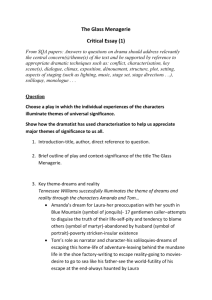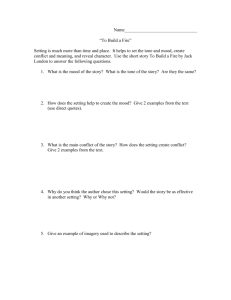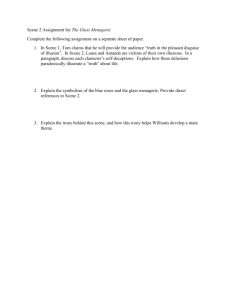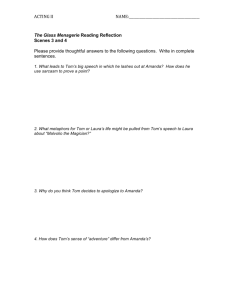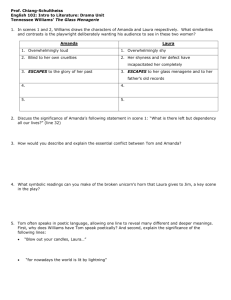The Glass Menagerie by Tennessee Williams
advertisement
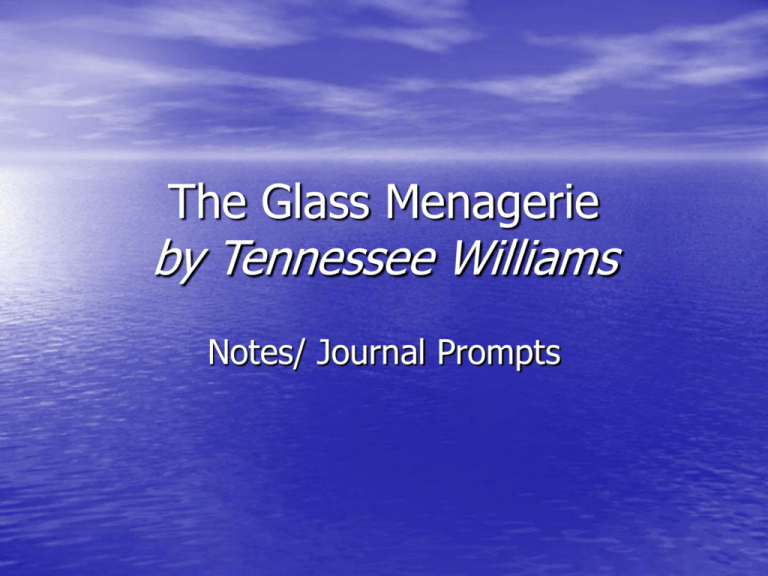
The Glass Menagerie by Tennessee Williams Notes/ Journal Prompts Literary Elements Journal • You will dedicate one page of your journal for each of the following literary devices. As we read The Glass Menagerie, you will take notes in your journal as you encounter these literary devices being used. After reading the play, you will write an essay analyzing four of the drama’s literary devices. Narrator/ Point-of-View • If you choose to focus on point of view, discuss the positive and negative aspects of the author’s choice. Characters and Characterization • Characters (static/ dynamic, round/ flat) • Protagonist • Antagonist Plot Structure • Exposition • Rising Action • Climax • Falling Action • Resolution Plot Structure • Conflicts (Describe and categorize) Flashback/ Foreshadowing Suspense Questions Diction (include denotation and connotation) Word Denotation Connotation Allusions Figurative Language • Metaphors, Similes, Personification Figurative Language • Imagery Figurative Language • Symbol Mood and Tone (include relevant passages) • Scene One (mood/ tone and passage) • Scene Two (mood/ tone and passage) • Scene Three (mood/ tone and passage) • Scene Four (mood/ tone and passage) • Scene Five (mood/ tone and passage) • Scene Six (mood/ tone and passage) • Scene Seven (mood/ tone and passage) Themes Journal Entry: Scene One • First, describe what Amanda, the mother, is expecting, the event for which she is waiting. Then, speculate on how Tom and Laura might be feeling about her expectation. Do they share it? What leads you to believe your opinion? How might you feel if you were Tom? How might you feel if you were Laura? Why do you believe Laura tells Tom they should allow their mother to tell her stories, even if they have heard them before? Journal Entry: Scene Two, Three • In these two scenes it becomes apparent that both Tom and Laura feel the need to escape. What do they do to escape? From what are they trying to escape? How might Tom and Laura relate to the symbol of the fire escape, and its “slow and implacable fires of human desperation” as mentioned in the Scene One? Have you ever felt the desperate need to escape? From what, or who. do you sometimes feel the need to escape? How, or to where, do you escape? Journal Entry: Scene Four • What are Amanda’s concerns about Tom? Are they legitimate (meaning, does she have good reason to be afraid for him)? Do you think that her concern has in any way shaped the way that he is? Explain. How have your parents or guardians shaped you, in either positive or negative ways? What have your parents done or said to cause you to develop these character traits? What will you do to influence your children (or children you may influence in some way, such as a niece or nephew, etc.)? Journal Entry: Scenes Five, Six • How does Amanda respond to the news of the gentleman caller? (Give some specific examples of her “plans and provisions.”) What is Amanda’s dream for herself and her family? How does Laura respond to the news of the gentleman caller? What do you think would make Laura happy? What dreams do you have that have been stifled by some person or circumstance? Describe in great detail what you think would make you truly happy, and then describe any person or circumstance that keeps you from attaining that dream. Journal Entry: Scene Seven • Write one sentence that states a theme from the play “A Glass Menagerie.” Then, write one sentence for each character summarizing the character’s traits. Finally, choose one character who you identify with in some way, and describe how you identify with that character. Tennessee Williams • Born – Year: 1911 – Name: Thomas Lanier Williams – Born in Columbus, Mississippi • Died – Year: 1985 – Name: Tennessee Williams – Died in New York Hotel Room • Interesting Tidbits: – His sister, Rose, had a collection of small glass animals that the two played with as children. – As teenagers, Rose began to go insane. Tom (Tennessee) began to realize his own homosexuality. – He adopted the name Tennessee after graduating from college. – His themes center around people trapped in their own personal versions of hell. – His most famous plays were his first: • The Glass Menagerie (1945) • A Streetcar Named Desire (1947)
